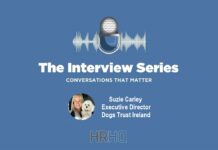by Peter Cosgrove, MD of Futurewise Ltd.
The internet has transformed the world of work — and nowhere is that more visible than in recruitment. With job postings now attracting thousands, sometimes millions, of applicants globally, the hiring process has been overwhelmed by sheer volume.
Take 2024 as an example: Goldman Sachs received over 315,000 internship applications. No human recruiter could reasonably sift through such numbers. To cope, employers began turning to digital tools. And in the last few years, artificial intelligence has supercharged this shift.
From Manual Hiring to Machine Learning
For decades, hiring was labour-intensive and human-driven. Recruiters read CVs, interviewed candidates, and relied heavily on intuition and experience. That era is ending fast. Today, AI is embedded at almost every stage of the hiring process. A recent Gallup survey found 93% of Fortune 500 CHROs are already using AI tools to enhance recruitment and HR practices.
AI’s promise? A process that is faster, more consistent, and free from human inefficiency. Imagine:
- Job descriptions written dynamically by AI to target the right talent.
- Candidate sourcing across global talent pools, even before people start job hunting.
- Resume scanning by algorithms that evaluate skills, experience, and even inferred capabilities.
- Automated scheduling, onboarding, and even early career development supported by digital mentors.
Specialised platforms like Eightfold’s Talent Intelligence and Mantrika are just two examples of the many AI hiring tools now available.
Candidates Fight Back
But employers aren’t the only ones wielding AI. Job seekers are fighting back with the same tools. It’s now common for candidates to:
- Use ChatGPT to generate CVs and cover letters packed with the right keywords.
- Paste likely interview questions into AI systems to generate polished answers.
- Get real-time coaching via discreet prompts through an earpiece during interviews.
- Polish pre-recorded video interviews with AI, editing out pauses and splicing multiple takes.
- Even apply synthetic voice filters to mask accents online, worried it might bias interviewers.
A survey shows 67% of candidates in the U.S. now use AI during the job hunt, and up to 22% use bots to auto-submit applications. The result is an arms race: AI-written CVs versus AI-driven screening systems. Employers hope to find authenticity; candidates hope to game the machine. We may feel we’ve moved forward, but in reality it’s often AI on one end reading AI content on the other.
The Problems With AI in Hiring
Serious questions have been raised by how the employee feels when an interview is partly AI-based. Issues like:
- Opacity: Candidates are often rejected and never know why. AI doesn’t always give reasons, leaving applicants in the dark.
- Performative over potential: The process rewards those who perform best for the algorithm, not necessarily those who can do the job best.
- Dehumanisation: Being interviewed by an algorithm feels impersonal, even alienating.
Then there is potential bias. Far from being neutral, AI systems inherit prejudices from their training data. Amazon famously abandoned its AI hiring tool when it downgraded CVs with the word “women’s”. HireVue dropped its facial-analysis features after criticism that they discriminated against certain skin tones and disabilities. These tools are improving but it is hard to say they are now unbiased.
Promise and Pitfalls
There’s no denying AI’s power in hiring. For employers it promises to:
- Predict future hiring needs and identify skills gaps.
- Tailor salary packages based on benchmarks and seamlessly organise employee contracts.
- Help new hires integrate faster through AI-guided onboarding and mentoring.
- Assist in analysing the performance of new hires.
But the pitfalls are just as real. There is still much we don’t understand about why AI chooses certain candidates. Yes, hiring is faster, more scalable, and potentially more consistent — but it’s also more performative, more opaque, and more open to manipulation.
The Human Touch Still Matters
Face-to-face interviewing and real-time testing remain the gold standard for truly understanding candidates — but only if done well. Unfortunately, too often, human interviews are riddled with their own biases and inconsistencies. The truth is this: AI is here to stay in hiring. The challenge is not whether we use it, but how we use it. Employers need robust auditing, transparency, and human oversight. Candidates need to remember that even if AI gets them through the door, only real skills will keep them in the job.
It is also clear that employers can’t criticise candidates for “cheating” with AI when they are doing the same themselves. There’s also a fair question to ask: if employees will be allowed to use AI once they’re in the job, why not in the interview too?
About the author
Peter Cosgrove leads Futurewise and is an expert on future trends and a much sought-after speaker on talks related to the future of work. He has over 25 years business experience on executive teams as well as on not for profit boards as board member and Chairman. He has been Chair of Junior Achievement Ireland, the National Recruitment Federation and currently serves on the 30% Club Steering Committee tackling gender balance and is Vice Chairman of Aware, a leading mental health charity. Peter has served as a Board adviser for a number of Staffing organisations and has been a contributor to the Expert Group on Future Skills.











































